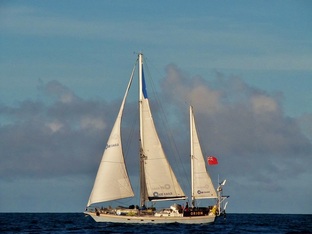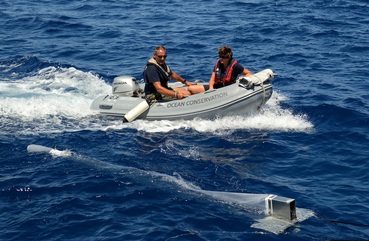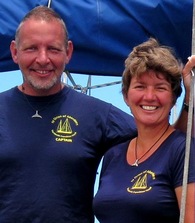 The Orion of Aberdeen at sail. (photo courtesy Orion crew)
The Orion of Aberdeen at sail. (photo courtesy Orion crew)
With blue skies, around 10 knots of wind and smooth seas, the crew decided to try out a trawl they’d received from 5 Gyres. They wanted to try it in the waters around Las Palmas, Grand Canary, before leaving for a larger trip to see how it worked and how it would affect the speed and steering of their boat, a 54-foot Koopmans-design ketch.
 Monitoring the trawl. (photo courtesy Orion crew)
Monitoring the trawl. (photo courtesy Orion crew)
They also spent time spotting larger debris in the ocean during the deployment of the trawl. While they didn’t see any debris, they were thrilled to spot a loggerhead turtle.
In the afternoon, the wind started gusting, so they brought the trawl back on board using an extra safety recovery line.
The effect on the boat handling and speed was minor, they said — around one knot that day, with wind 8–10 knots north, half wind, current 1.5 knots on the head.
Next they began another part of the experiment: analyzing the contents of the net. It was challenging to determine the material of some particles, they reported, but Joel and Brenda — both marine scientists — managed well. The net contained 11 tiny particles of plastic, all smaller than five millimeters.
 Edwin and Marjo (photo courtesy Orion crew)
Edwin and Marjo (photo courtesy Orion crew)
“All in all, we had fun with the experiment and are looking forward to the next trawl, knowing that plastic is a serious and urgent worldwide problem.”
Edwin Butter is an HSE certified commercial diver and a pilot who has traveled the world for the past 15 years, from the Arctic to the Antarctic. Marjo Boertien is a former business consultant and has sailed and lived on a boat for the past four years. “100 percent dedicated to improving and protecting marine life,” they host up to four scientists at a time on the boat.
